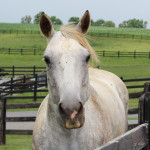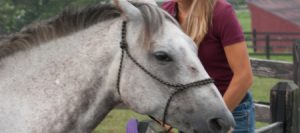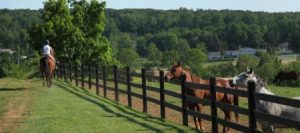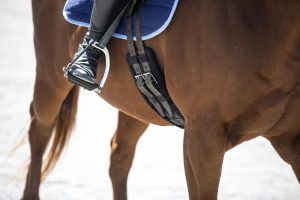Is your horse smart? What does smart really mean? How do you know how intelligent or mentally gifted your horse is? The amount of intellect, emotion, and brain power we believe our horses possess will have a lot to do with how we handle, train, and care for those horses. I believe that problems arise when we think of our horses at either end of the “smarts” spectrum.
In the past, the cognitive abilities of horses were not often considered, or worse, horses were just classified as very low intelligence with a small brain and lack of any real cognitive abilities or emotional intelligence. Obviously this kind of a viewpoint can be allowed to justify harsh treatment, rough training, or prolonged confinement in a stall. However, the mistreatment can be just as severe when horses are thought of as having thoughts and a brain process too similar to ourselves. For example, punishments are used because “he knows he’s being bad,” “he saw that jump yesterday,” or training is progressed far too quickly under the assumption that the horse intuitively understands what is being asked.
 Our basic brain functions may be similiar, but we still think very differently than our horses
Our basic brain functions may be similiar, but we still think very differently than our horses
What is the right approach to understanding our horse’s true mental processes? How smart is your horse, really? These are questions that unfortunately there is no black and white answer for. Luckily there is an increasing amount of research being dedicated to equine cognition, behavior, and learning theory, but even with the best studies we will never truly know what it’s like to be a horse. I believe the most important thing to remember is that horses do not think or reason in the same ways we do. In some senses they are far superior – such as their abilities to sense changes in their environment, spot tiny movements almost anywhere around them, or pick up on the “energy” of their rider through subtle cues that most humans would not notice.
We are similar to the horse in that we both learn through associations as well as cause and effect. We are different in that, as humans, we can reason, actively problem solve, and use “logic” to determine our actions in new situations. While horses have an excellent long term memory, they cannot think in the same ways we do. Horses are able to learn very quickly, but if our timing is off or our training methods poor, they may be learning something other than what we are trying to teach them.
The short term memory they use to connect events and form behaviors is quite poor compared to humans and even other domestic species such as dogs. In an experiment that has been repeated several times to show this concept of short term memory, a horse would be led into an arena where he or she was held to watch as grain was dumped into one of two buckets positioned several feet away. The horse would be held for an increasing number of seconds, then released to go to the bucket and eat the grain. The surprising result was that the majority of horses could not make it 10 seconds before forgetting which bucket held the food. Several researchers have conducted this same experiment and while their results did vary (probably depending on the attention of the horses and other distractions present) – most horses were still under that 10 second mark. This means that our responses to our horse’s behavior must be very timely if they are to be correctly understood in the horse’s mind. However brief the short term memory, once a horse has learned a behavior (good or bad) they remember it, and are able to demonstrate that behavior again, without practice, many years later.

There is also a good deal of discussion about the horse’s abilities to generalize or “learn to learn”. This topic calls into question the role we play in how “smart” our horse is. Our management and training practices with our horses have a huge effect on how well our horses can generalize new situations or new objects. Horses do not generalize like we do – for example, we all learned quickly that a red octagon sign means STOP – whether we see it in the city, on a back road, or even on a board game. In contrast, a horse may understand that white poles in the arena are something he is supposed to jump over, but those same white poles in an open field may not have the same meaning for him! However, there is quite a bit of evidence that horse can become better at generalizing the more different situations and training questions they are exposed to. For example, most lesson horses are great at generalizing the rider’s cues, as they have come to understand that legs somewhere on their sides mean go forward and rein pressure probably means stop. Horses in cognition experiments have also learned to generalize such concepts of “larger than” when choosing between two stimuli. So the more new and novel activities we can do with our horses, the better they will learn and perform in the future.
One last thought is that we must always be careful not to project our own likes or dislikes (or our feelings) onto our horses. It is important to pay attention to our horse’s behaviors for clues to what they like or dislike. Just because we get cold on a winter day does not necessarily mean our horse wants a blanket on too. Likewise we may love to pet and scratch our horses but if they don’t truly value that petting and scratching it is not going to be an effective positive reinforcement for training.
Horses are intelligent, they can learn quickly and retain new skills for a very long time. But they are still very different than us – and by remembering these differences we can be kinder, fairer, and more effective in our training.
What are your thoughts and experiences regarding equine intelligence?
Sources:
Leblanc Michel-Antoine. The Mind of the Horse. Cambridge: Harvard University Press. 2013 Click Here to read my review on this book!
Hanggi, Evelyn B., “The Thinking Horse: Cognition and Perception Reviewed.” AAEP Proceedings. Vol. 51, 2005: 246-255.














5 Responses
My horses were rescued from a neglect situation. I had owned both of them prior to them going to this stable. Neither horse had any “bad” manners around humans. My mare weaved when I first bought her; however, this vice diminished with 24/7 turnout. Then I had to sell them because my husband was very ill and I had no time to properly care for them. They spent the last eight years at this riding stable/horse rescue and were used heavily as lesson horses. I have since learned that both horses were ridden with open girth sores, had numerous falls or riding accidents and were ridden with poorly fitted tack. My mare now tries to bite me when I attempt to saddle up. She has “remembered” all the misery she had to endure over the last eight years and now that she’s back with me, she’s not very keen to be ridden with a saddle. She’s fine bareback. When my gelding sees me coming to the barn with tack, he walks away. He too, remembers all the bad things and wants no part of it. Because they were slowly being starved, they were very aggressive during feeding times. But thankfully, that behavior has all but disappeared over the last seven months with proper nutrition and regular feed and turnout. Other than my mare’s biting, they have returned to the wonderful companions they were before I had to part with them. I plan to put to use Callie’s tips for ground manners to help my mare get over her anxiety of being saddled. And, I am being very particular about finding a saddle that fits them correctly (which is proving rather difficult because of their short, round Arabian backs).
Hi Mary Ann,
I am so glad you were able to get the horses back and give them a good home again after all those years! Keep me updated with how your work with them progresses!
You share a good bond with your horse. I enjoyed reading the blog and found it quite interesting. Maybe in your next blog, please mention some of the good providers of horse rugs and other turnouts. By the way, thanks for sharing this article, it’s very informative.
I am new to your site and so far am very impressed. I have a OTTB for the past 2 years and who I feel is smart. She picks up training pretty easy. I have taught her to jump and she seems to really enjoy it. However I would like to teach her to trail ride and that is where I ham having problems. She will go out with other horses no problems, but I can’t get her off the farm by herself. Once she hits the boundaries of the farm we are in a stand off. Any suggestions as to get her comfortable being by herself?
Thanks
Hi Laura,
Slow and steady… I will often lead horses out that are nervous by themselves and will simply go a little further each day. I will go out and do things they are familiar with – like a simple exercise from the ground or a game with the clicker. Each day we will push the comfort zone a little bit then come back. It can take a lot of time and patience but it does help.